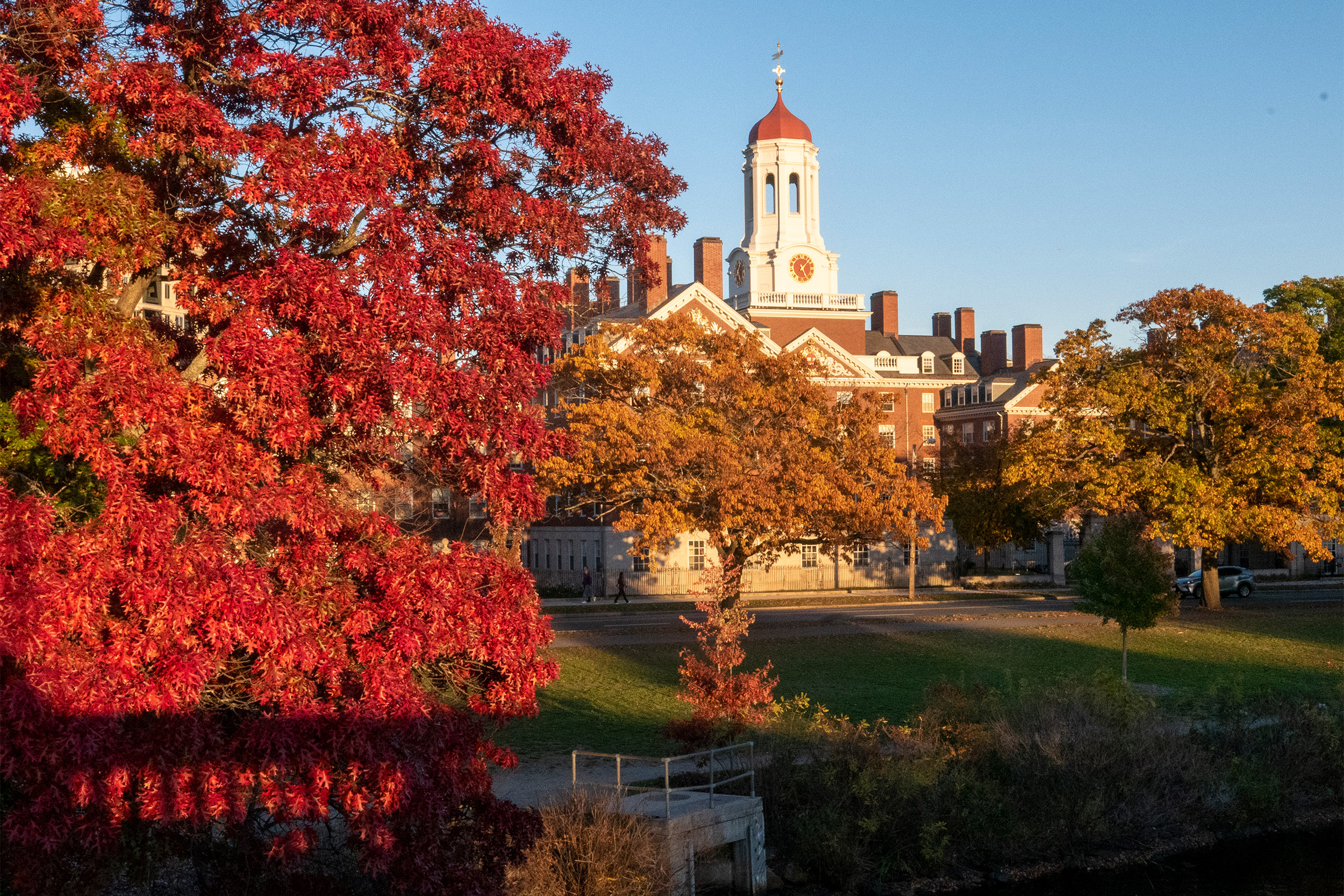
Fall foliage frames Dunster House.
Jon Chase/Harvard Staff Photographer
13 projects win grants to continue fostering diversity, inclusion on campus
Recipients of Harvard Culture Lab Innovation Fund awards come from across Schools and Units
The Harvard Culture Lab Innovation Fund (HCLIF) has awarded grants to 13 teams that have designed and created projects aimed at fostering diversity and equity on campus while helping advance a culture of inclusion.
“Changing culture around equity, diversity, inclusion, and belonging at Harvard and elsewhere requires new ideas not just from leaders, but also from those with the daily lived experiences of their communities,” said Sherri Charleston, Harvard’s chief diversity and inclusion officer. “I’m inspired by all the individuals who have received a grant and commend their collective ambition to make Harvard a more equitable and inclusive space. I’m looking forward to seeing the outcomes of each project.”
This year’s recipients include undergraduates, graduate students, postdoctoral researchers, staff, and faculty, representing a range of Harvard’s Schools and units, with several teams made of up of representatives from more than one School.
The awardees include new projects like To Be Seen, which aims to add signs acknowledging Indigenous lands on public trails, thereby interrupting the dominant colonizer narratives that devalue the lived experiences of Indigenous community members, and redesign signage that acknowledges Indigenous land. The project is a collaboration between a postdoc, undergraduate students, the Harvard Forest, Harvard University Native American Program, and the Nipmuc community to amplify Indigenous voices on public lands.
Other projects include more established initiatives that are developing new ways to engage the community, like the Inclusive Teaching Institute, which helps faculty and instructors explore inclusive and blended teaching. The group plans to use the grant to expand their network beyond Harvard Extension School and Harvard Summer School to the whole University.
Mary DiSalvo, whose project, the Language Exchange, was awarded a grant, and who works as the language support manager and IT liaison at Harvard’s Language Center, spoke about why the program that helps people practice speaking other languages will make a difference.
“The Language Exchange provides a shared social and linguistic space like no other at Harvard,” she said. “When used to its full potential, the Language Exchange allows Harvard community members to take full advantage of the breadth of cultural and linguistic experience, just a few clicks away.”
Octavious Talbot, a Ph.D. candidate in biostatistics at the School of Public Health and the leader of StatStart, another awardee, said his project to bring STEM learning to underrepresented high school students will continue to improve learning outcomes with support from the grant. “StatStart has demonstrated that, in a short month, students from a diverse background can be motivated to pursue STEM by focusing on their strengths, fellowship, and mentorship,” he said.
Additional 2022 HCLIF recipients
- ADAPT, a crowdsourced resource for librarians that will screen third-party databases, provide training, and support accessibility reviews, with the goal of boosting usability for library patrons.
- The Black Staff Caucus at Harvard Longwood Campus is creating a dedicated space for personal and professional growth and well-being of Black staff members, providing resources for career advancement, equity and social justice, and cultural programming.
- The Culture Ambassadors Network at HKS trains staff at the Kennedy School on best practices for creating sustainable impact and change around diversity and facilitates anti-racism throughout the School’s centers and departments.
- Decolonized HEALing is an empowerment intervention program based on mental health and focused on Harvard scholars identifying as queer, trans, Black, Indigenous, and other people of color (QTBIPOC). The research project, led by doctoral students and supported by a team of faculty and staff from the Faculty of Arts and Sciences, Harvard Medical School, and Counseling and Mental Health Services, aims to learn about and address concerns via behavioral therapeutic styles and cultural wellness.
- First-Generation Visibility Week offered a series of events in November to empower, celebrate, and validate the identities of first-generation students at Harvard.
- Harm to Harmony II, a program at Harvard College, is deepening restorative justice practices in residential communities with the goal of fostering community-based norms around prevention, intervention, and responses to harm.
- The Harvard University Peer Coaching Initiative, a second-year awardee, will expand its reach to more students and increase the length of the intervention to foster measurable cultural changes and move toward inclusive excellence.
- Instructional Moves 3.0: Educating for Equity and Inclusion, created at the Graduate School of Education, is a professional learning experience designed to help Harvard instructors see and transfer examples of teaching more equitably and inclusively in Harvard classrooms.
- The Neurodiversity Project, a subset of the MIND project, is creating spaces for collaboration, advocacy, and support for the neurodiverse community and raising awareness about the scientific and life challenges caused by neuropsychiatric and neurodevelopmental conditions.
Applications for 2023 HCLIF grants are open to any Harvard student, educator, or employee with ideas that foster belonging and identify a critical challenge around diversity, inclusion, or belonging on campus. Applications can be submitted to the Harvard Culture Lab, and are due by March 24, 2023.




